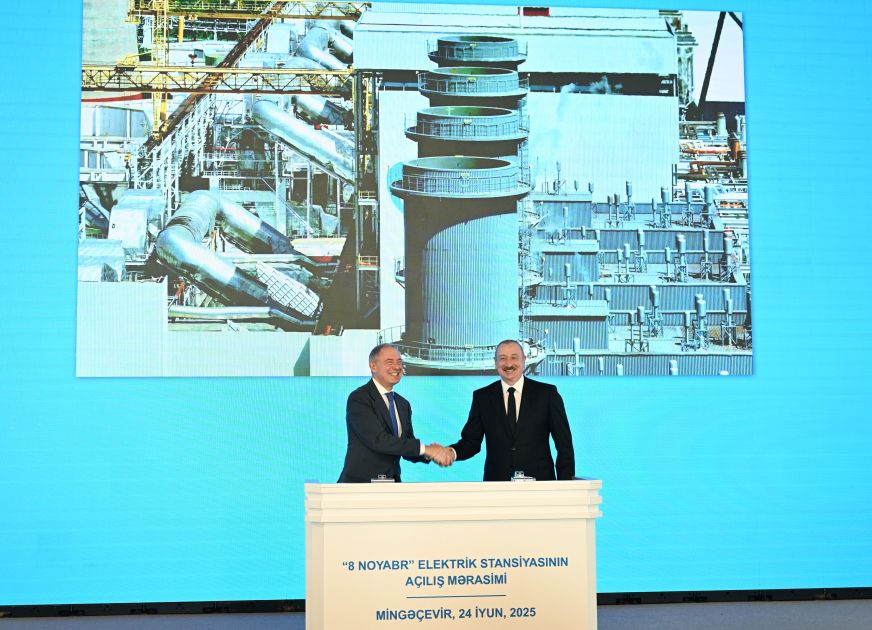Azerbaijan's energy transformation balances tradition, efficiency and sustainability

Energy security has become the most pressing global concern today. As the world faces unprecedented shifts in energy demand and supply dynamics, Azerbaijan stands at a critical juncture in its energy development. Rich in hydrocarbon resources, the country is simultaneously embracing the global energy transformation by expanding its renewable energy capacity. This strategic dual approach reflects Azerbaijan’s recognition of its abundant renewable potential and the imperative to balance economic growth with environmental responsibility.
President Ilham Aliyev highlighted this vision during the inauguration of the “8 November” Power Plant in Mingachevir on June 24, stating, "Today is a significant day for the energy sector of our country... This plant will further strengthen our energy potential, increase efficiency, and reinforce the status of Mingachevir as the energy center not only of Azerbaijan but also of the entire South Caucasus."
His remarks underscore Azerbaijan’s ambition to lead not just nationally but regionally in energy security and innovation. Energy efficiency is at the heart of Azerbaijan’s ongoing energy modernization. The “8 November” Power Plant, with a capacity of 1,880 megawatts, exemplifies how Azerbaijan is increasing output while reducing fuel consumption. As President Aliyev noted, "The commissioning of the '8 November' Power Plant will... significantly reduce conventional fuel consumption. This creates an opportunity to save natural gas, which is in high demand on world markets today."
This emphasis on efficiency enables Azerbaijan to preserve valuable natural gas resources for export, amplifying economic returns and geopolitical influence. It also signals a shift in energy policy where reducing environmental impact goes hand in hand with bolstering energy security.
Moreover, the government’s plan to add 6,500 megawatts of renewable energy by 2030, complementing the current 9,000 megawatts capacity, indicates a deliberate and forward-looking strategy to diversify the energy mix. This will not only lower emissions but also buffer the economy against global fossil fuel market volatility.
Beyond domestic consumption, the country has evolved into a key energy exporter. Azerbaijan currently supplies natural gas to 12 countries, including 10 in Europe, a market breadth that few global producers match. This export footprint reinforces Azerbaijan’s role as a reliable energy partner on the continent, a point President Aliyev emphasized:
"Azerbaijan is among the countries contributing to European energy security today... Azerbaijani gas is exported to 12 countries, and it is precisely according to this indicator that Azerbaijan is in the leading positions on a global scale."
The efficiency gains from projects like “8 November” enhance export capacity by freeing up natural gas volumes. Additionally, Azerbaijan’s export portfolio includes crude oil, petrochemicals, and electricity, with future green energy exports poised to further diversify the country’s energy diplomacy.
This export strength not only boosts Azerbaijan’s economy but also enhances its geopolitical leverage, allowing it to act as a pivotal energy corridor between East and West.
The rapid completion of the “8 November” Power Plant—delivering
nearly 2,000 megawatts in just two years—is a striking achievement
in project management and engineering. President Aliyev contrasted
this with Soviet-era timelines, noting,
"During the Soviet era, the construction of the 'Azerbaijan'
Thermal Power Plant began in 1974, and the first unit was
commissioned in 1981... We have now obtained about 2,000 megawatts
in just two years."
This efficiency reflects not only the skill and professionalism of Azerbaijani engineers but also the success of international partnerships, especially with Italy and China, both strategic allies in energy development.
The plant’s contribution extends beyond capacity. By reducing fuel consumption and boosting overall system efficiency, it aligns with Azerbaijan’s broader environmental goals. Mingachevir’s status as a regional energy hub is further cemented, with the city producing over 40% of the country’s electricity—a legacy rooted in initiatives started by National Leader Heydar Aliyev decades ago.
Azerbaijan’s energy sector transformation over the past two decades is a model of resilience and strategic foresight. The inauguration of the “8 November” Power Plant is not only a technical milestone but also a symbol of the country’s comprehensive energy policy—one that integrates efficiency, sustainability, and export capacity.
As President Ilham Aliyev aptly summarized, "Several objectives are being met here... Our well-considered policy forms the basis of all these successes."
Looking forward, Azerbaijan’s continued investments in both renewable and traditional energy will solidify its role as a regional energy leader and a vital contributor to global energy security. By balancing the demands of today with the vision of tomorrow, the country is ensuring that energy remains a cornerstone of its economic development and geopolitical influence.
Here we are to serve you with news right now. It does not cost much, but worth your attention.
Choose to support open, independent, quality journalism and subscribe on a monthly basis.
By subscribing to our online newspaper, you can have full digital access to all news, analysis, and much more.
You can also follow AzerNEWS on Twitter @AzerNewsAz or Facebook @AzerNewsNewspaper
Thank you!

